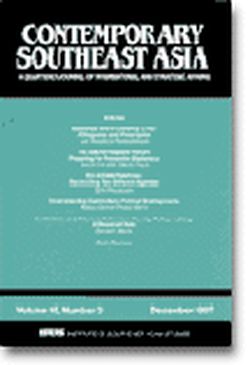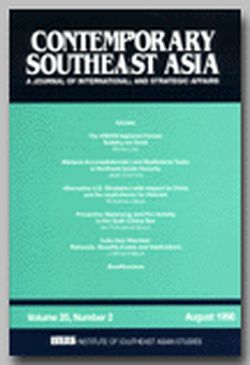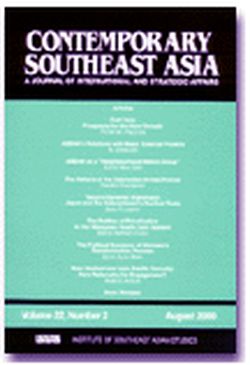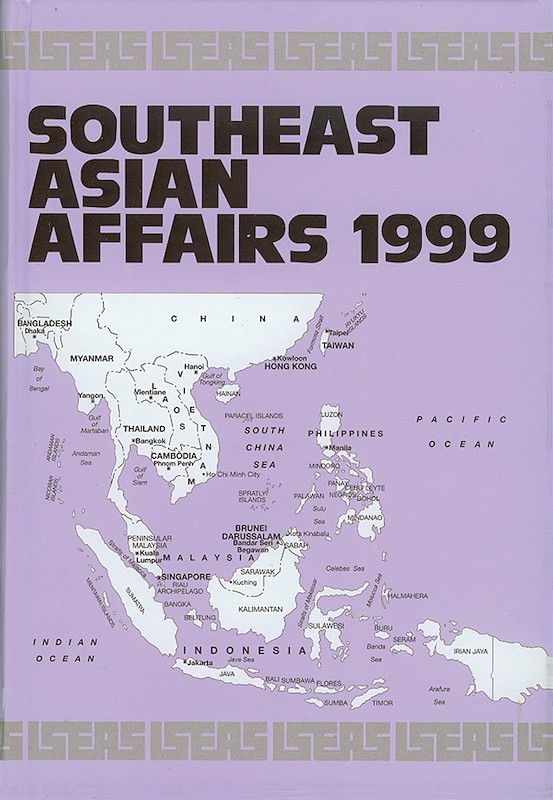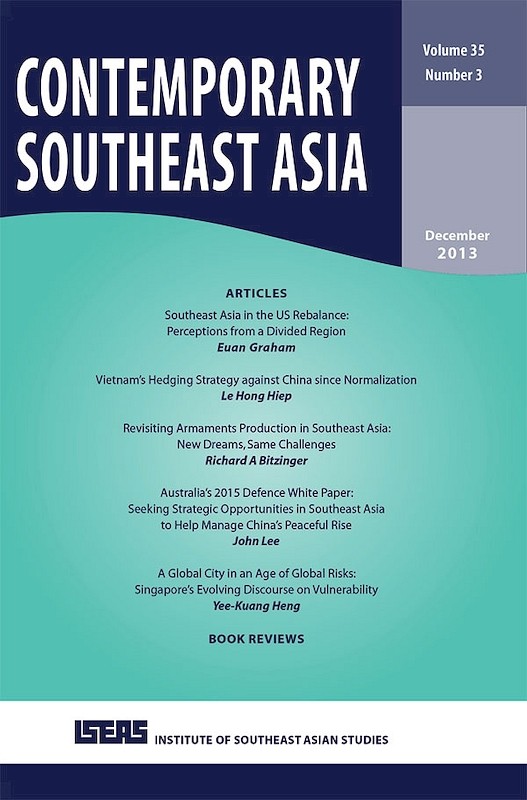Contemporary Southeast Asia: A Journal of International and Strategic Affairs Vol. 26/2 (Aug 2004)

Date of publication:
August 2004
Number of pages:
199
Code:
CS26/2
Contents
-
Contemporary Southeast Asia: A Journal of International and Strategic Affairs Vol. 26/2 (Aug 2004)
-
Preliminary pages
- ARTICLES
-
Addressing International Terrorism in Southeast Asia: A Matter of Strategic or Functional Approach?, by Renato Cruz De Castro, author see abstractThis article traces the evolution of the American-led global campaign against international terrorism in Southeast Asia. The Bush administration's new national security strategy in September 2002 radically transformed the war on terror in Southeast Asia and might create a major problem in Americas efforts to foster cooperative security since states in the region seem averse to the strategy of preemptive defense. The best way to counter terrorist organizations is through the cooperative security or functionalist approach rather than the strategic/military mode, which tends to generate conflicts among state actors who are faced with a common security challenge.
-
International Criminal Court: Reservations of Non-State Parties in Southeast Asia, by Valeriane Toon, author see abstractDebates over the merit of supporting the International Criminal Court (ICC) continue with fervour at the United Nations Security Council and General Assembly, in spite of steadfast opposition by the United States towards the Rome Statute and its pro-active attempts in thwarting the ICC's sphere of influence with bilateral immunity agreements. In assessing the dominant reservations withholding non-party Southeast Asian states from endorsing the ICC -- be it apprehension over politically-motivated accusations, the desire to uphold the norm of national sovereignty over erga omnes, domestic considerations such as opposition from vested interest groups, or pressure from the US to reject the Statute altogether - this article discerns a conspicuous trait spanning all countries, i.e. public opinion, even in democracies, is secondary to state elites obsession with preservation of state sovereignty and regime sustenance.
-
Political Transition in Myanmar: A New Model for Democratization, by Ashley South, author see abstractThis article examines social and political transition in Myanmar (Burma). Strategies for transition in Myanmar have tended to focus on elite-level politics, rather than grassroots democratization and social mobilization. However, both approaches are necessary. While change at the national/elite level is urgently required, sustained democratic transition can only be achieved if accompanied by local participation. This article examines the strategic challenges facing ethnic nationalist leaders and communities at this key period in Myanmar's history. It also addresses the roles that foreign aid can play in supporting the re-emergence of civil society in Myanmar, and advocates a policy of selective (or targeted) engagement.
-
The Paradox of Indonesian Democracy, by Leonard C Sebastian, author see abstractThe April 2004 Indonesian general election, specifically the election for the House of Peoples Representatives, produced an indecisive result. The election results point to the fact that with an absence of any dominant party, the Indonesian political scene will be more splintered, with the likelihood of the government emerging from the election process being a product of power-sharing arrangements and coalition politics essentially the characteristic feature of Indonesian politics. This article argues that the popular perspective that chronic instability will be the outcome of such political conditions is flawed but rather the adoption of power-sharing formulas will be a defining characteristic of the character of Indonesia's democratic system.
-
Local Elections and Party Politics in Post-Reformasi Indonesia: A View from Yogyakarta, by Nankyung Choi, author see abstractThis article examines elections for local executive heads in post-Soeharto Indonesia, particularly in relation to the reactivated and decentralized political corruption in democratic political institutions. Money politics preferred by many Indonesians, including scholars and even ordinary citizens, to differentiate from the corruption of the authoritarian past still dominates political discourse despite the early hopes for responsive and accountable government, which underpinned the reformasi movement. The author uses the 2001 Yogyakarta mayoral election as a case study to examine how such undemocratic and corrupt practices as local assembly members vote selling in elections for regional heads has emerged as an actual pattern of the revitalized multi-party parliamentary politics in Indonesia.
-
Sino-Thai Strategic Economic Development in the Greater Mekong Subregion (1992-2003), by Siriluk Masviriyakul, author see abstractWith globalization, the sub-regional economic zone has become the prominent trend in economic cooperation in Asia. In Mainland Southeast Asia, it is expected that the Greater Mekong Sub-regional Economic Zone (GMS) will play a significant role in sub-regional economic development in the future. However, over a decade since its inception, few GMS projects have been implemented. This article examines Thai and Chinese economic strategies towards the GMS framework and explores Sino-Thai strategic economic cooperation to better materialize the GMS program. It argues that Sino-Thai strategic economic development in the GMS has become a powerful means to strengthen the GMS. Furthermore, it is in line with the national development of the two countries. As a result, China and Thailand have pushed various GMS projects, in particular, the GMS's North-South Economic Corridor, encompassing China's Yunnan province, Myanmar, Laos and Thailand, which will facilitate economic activities along the corridor and create economic linkages between the GMS countries.
-
Assessing Sino-Vietnamese Relations through the Management of Contentious Issues, by Ramses Amer, author see abstractThis article analyses the relationship between China and Vietnam since 1975 with a focus on developments since full normalization of relations in late 1991. The study encompasses the major developments in the relationship, i.e. the deterioration of relations that took place during the late 1970s, the period of continued conflict and tension in the 1980s, the process of normalization of relations between China and Vietnam in the late 1980s and early 1990s; and, the developments since full normalization relations. In analyzing the deterioration of relations, the continued conflict situation as well as the normalization process the following issues are discussed and assessed: differing perceptions of the Soviet Union, relations to and influence in Cambodia, the ethnic Chinese in Vietnam, and territorial disputes. The analysis of the period following full normalization of relations focuses on the expansion of relations as well as on the impact and management of contentious issues, in particular the territorial disputes between the two countries. The article concludes with an evaluation of the progress made, lessons learned, and the remaining challenges in managing disputes in Sino-Vietnamese relations.
-
Pakistan, SAARC and ASEAN Relations, by Faizal Yahya, author see abstractThe South Asian Association for Regional Cooperation (SAARC) grouping held its 12th summit meeting in Islamabad, Pakistan from 4 - 6 January 2004. ASEAN has often been regarded as a model for SAARC to emulate. The two biggest countries and economies in SAARC, namely India and Pakistan have also formalized relations with ASEAN but to different degrees. Pakistan is a sectoral dialogue partner of ASEAN, while India has become a Summit level partner as well as being included in the ASEAN Regional Forum (ARF) which deliberates political and strategic matters. To a large extent the bilateral relations between India and Pakistan have often dictated the progress in SAARC. This article aims to address the implications of improved intra-SAARC relations between India and Pakistan and what this might mean to Pakistan and ASEAN relations as Pakistan seeks to achieve parity with India in this regard.
- BOOK REVIEWS
-
BOOK REVIEW: Security and Southeast Asia: Domestic, Regional, and Global Issues. By Alan Collins., by Greg Felker, author
-
BOOK REVIEW: The Politics of Power: Freeport in Suhartos Indonesia. By Denise Leith., by Andrew Symon, author
-
BOOK REVIEW: Wooing The Generals: Indias New Burma Policy. By Renaud Egreteau., by Kripa Sridharan, author
-
BOOK REVIEW: Making Enemies; War and State Building in Burma. By Mary P Callahan., by Kwa Chong Guan, author
-
BOOK REVIEW: Non-traditional Security in the Asia-Pacific: The Dynamics of Securitisation. By Ralf Emmers, by Rommel C Banlaoi, author

